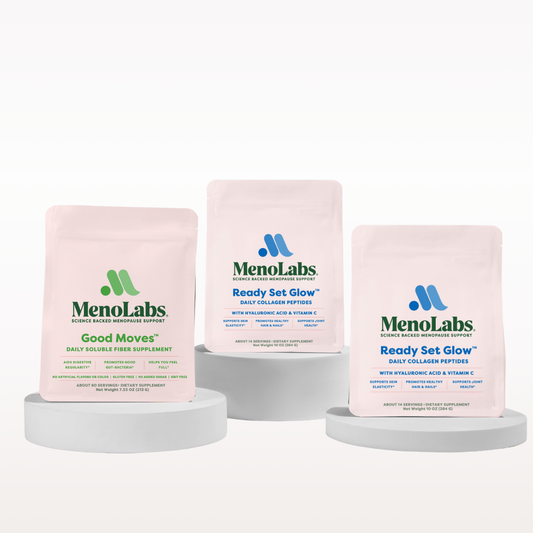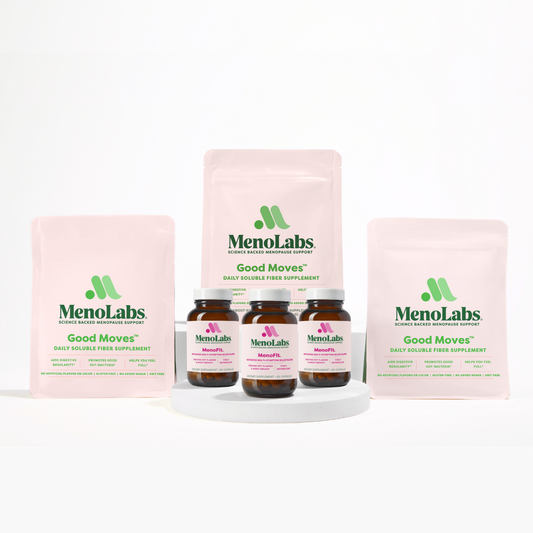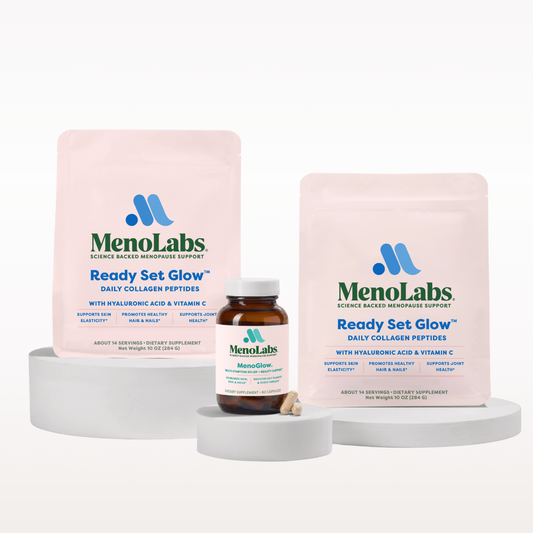
- Beauty
- hidden
- Sleep
Is there a connection between peri/menopause and diabetes?
Although it seems like peri/menopause could play a role in women getting diabetes in mid-life, studies show over and over that hormones aren’t affecting the onset of diabetes. It is...
1 min read
There are so many health concerns during mid-life. You go from never needing to go to the doctor to make sure you have your annual schedule down for all of the specialists you need to see. It makes you start to wonder if peri/menopause is the culprit for all of your new health concerns.
Does peri/menopause increase diabetes risk?
Developing Type II diabetes coincidentally can happen around the same time women are entering perimenopause or menopause. Some experts note that peri/menopause does not cause diabetes but other studies show that menopause does increase the risk of diabetes. We do know that weight, genetics and lifestyle factors certainly have an impact on the development of diabetes.
What is diabetes?
Mayo Clinic defines diabetes as having excess sugar in the blood. There are three levels of diabetes to consider:
Type 1 Diabetes: This type of diabetes is usually associated with hereditary links. Younger people are also more affected by this type of diabetes.
Type 2 Diabetes: Obesity is the main factor for this type of diabetes and usually affects people 40 and above.
Prediabetes: This is when your blood sugar levels are higher than normal but not high enough to require diabetes medication. Unless lifestyle changes are made, people who are diagnosed with prediabetes usually get diabetes.
What are the risk factors for type 2 diabetes and prediabetes?
Mayo Clinic states that it is not known why some people get type 2 diabetes and prediabetes and some don’t, but the medical center provides a list of things that could make a person more susceptible to getting both:
- Being overweight.
- Not living a healthy lifestyle: working out and eating healthy.
- Knowing your family's health history. Usually, when other family members have type 1 diabetes, you can expect to potentially get it, too.
- Black, Hispanic, American Indian, and Asian American people are at a higher risk of having diabetes.
- It used to be that older people were more prone to getting type 2 diabetes, but in recent years younger people are starting to get type 2 diabetes, too.
- Women with polycystic ovarian syndrome (PCOS) are prone to get type 2 diabetes.
- Having high blood pressure is linked to getting type 2 diabetes.
- Unhealthy cholesterol levels are usually linked to type 2 diabetes.
What are the symptoms of diabetes?
- Feeling an increased need for liquids
- Frequent need to urinate
- Sudden weight gain
- Infected gums
- Skin discoloration
- Strange sensation in your feet (like pins and needles)
- Hearing or vision loss
- Long naps (daytime naps longer than an hour)
People usually expect to experience the top three symptoms if they have diabetes, but as you can see there are other ways diabetes can affect you. The only way to find out if you have diabetes is with a blood test.
How can you lower the risk of diabetes?
The one thing that diabetes and peri/menopause symptoms have in common is a lifestyle change can help you manage them. To make things easier for each health condition, it’s all about making the following changes:
- Physical activity is essential. The goal is to keep your weight at a healthy level. Have fun with this and figure out what works for you so that you can sustain this activity.
- A study found that watching TV increased the risk of getting diabetes, which underscores the importance of activity! Yes, you may work out for 30 minutes to an hour a day, but there are still at least 15 more hours a day to find things to do other than watch TV. Set a TV and electronics limit for the day. Then, find other activities to get you out and about like gardening, joining a walking/hiking club, swimming, and more.
- Foods that increase the chance of getting diabetes and worsen peri/menopause symptoms include processed foods, red meats, and sugar-sweetened drinks. A plant-based diet is an optimal choice, no matter what state your health is in.
For people with diabetes, here are some ideas for how to keep your blood sugar under control:
- Sleep: CDC research shows that insulin resistance is more common in people who don’t get enough sleep. Eight hours of sleep is recommended, which can be interrupted by night sweats during peri/menopause. Studies show that women who sleep too long (longer than 8 hours) or too short (less than 5 hours) were at a higher risk of getting diabetes.
- Drink more water: Cut out sugary drinks and alcohol, and increase water intake. That can be done with water, sparkling water, tea, and coffee with no added sugar.
- Stress: Diabetes and depression are linked. Stress can lead to insulin resistance. A study found that depression is connected with diabetes because it’s usually associated with people who don’t exercise, smoke, and who consume an unhealthy diet.
Probiotics and diabetes
During midlife, prevention seems to always point to maintaining a healthy lifestyle. Apart from that, probiotics also seem promising in managing diabetes, which is very important to know for women in menopause. A study has shown that probiotics can reduce insulin resistance and glucose levels, which means that they can help you manage type 2 diabetes. Diverse gut microflora plays an important role in your body. It can help supports your immune system, can help to control weight, and generally has a positive effect on your health.
Probiotics have a positive effect on your body mass index (BMI), inflammation, glucose levels, and liver function. Those taking probiotics could notice weight loss and decreased risk of heart disease. The friendly bacteria in your gut could also improve the distribution of fat and body composition. Different probiotics seem to help you absorb and digest sugars and fats, improve microflora of the gut, metabolism of bile acid, and the function of the gut barrier.
Related Products
Blend Besties Bundle
Fresh Start Bundle
4.7 / 5.0
(553) 553 total reviews











